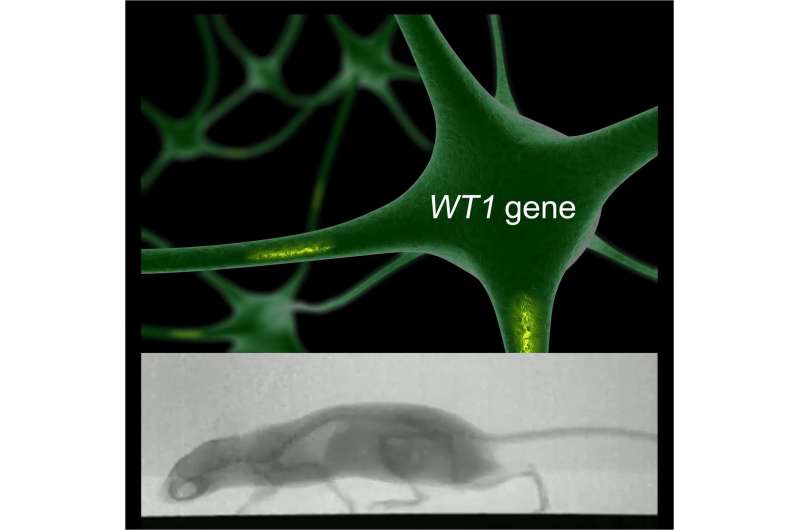WT1 "kidney-gene" plays a role in the central nervous system and controls movement

The WT1 gene fulfills a central role in the development of a healthy, functioning kidney. Mutations in WT1 lead to impairments in kidney development and cause Wilms tumors, a pediatric kidney cancer. Researchers at the Leibniz Institute on Aging – Fritz Lipmann Institute (FLI) in Jena have now discovered a further important function of WT1. It is also active outside the kidneys in the central nervous system and is involved in controlling movement. If the gene is missing in the spinal cord, locomotor aberrancies occur. The results have now been published in Life Science Alliance.
"This result was completely surprising for us, because we thought we already knew the WT1 gene quite well after all those years of research," says Prof. Christoph Englert, group leader at FLI. "Until now, the Wilms tumor suppressor gene WT1 was known as an important gene for the development and maintenance of various organs such as kidneys and heart. But it also influences our movements."
But what function does this gene play in the central nervous system? The researchers analyzed in which areas of the spinal cord and brain the WT1 gene is active. They examined mice that lacked the gene. "A loss of the gene changes the motor processes; the mice show problems with the coordination of their legs, which leads to a changes in their walk," says Dr. Danny Schnerwitzki, first author of the study.
The intestine, respiration and gait are controlled and regulated by neural networks that work like circuits. Neurons of the brain and spinal cord are also involved in these processes. "We were able to show that the WT1 gene controls a certain group of neurons that is responsible for locomotion," says Dr. Schnerwitzki about the results. They show that the development of certain neurons in the spinal cord depends on WT1 expression and that a loss of WT1 is linked to locomotion.
WT1 controls neuron specification
"In a second step, we investigated the development of neurons as a function of WT1 expression and performed locomotion analyses of WT1 knockout mice," says Prof. Englert. The researchers used molecular biological and electrophysiological approaches as well as a special X-ray method developed at the Institute of Zoology and Evolutionary Research of FSU to visualize changes in locomotion. "Our data indicate that the gene not only contributes to the coordination of locomotion, but is also required for proper differentiation of spinal cord neurons during embryogenesis," says Englert.
Also using zebrafish, the researchers found WT1 in neurons of the spinal cord. This indicates that the function of the gene is evolutionarily conserved. In fish, the gene seems to be responsible for controlling swimming movement.
The study demonstrates the previously undescribed importance of WT1 in the development of spinal cord neurons, and emphasizes its role in the circuits responsible for the functional implementation of locomotion in the neurons. "Studying patients with a WT1 mutation could show us what differences in the role of WT1 humans in comparison to the model systems show and uncover its contribution to locomotor changes."
More information: Danny Schnerwitzki et al. Neuron-specific inactivation of Wt1 alters locomotion in mice and changes interneuron composition in the spinal cord, Life Science Alliance (2018). DOI: 10.26508/lsa.201800106





















